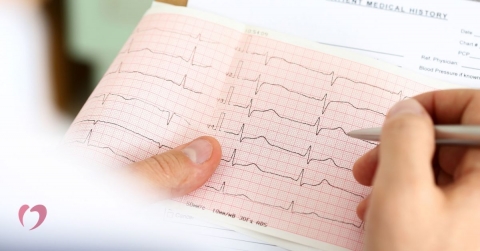Understanding Ventricular Arrhythmias

Timing is everything—especially for your heart.
Your heart is a finely tuned instrument responsible for keeping you alive. It beats according to a very specific timing, and that timing keeps your body running smoothly. But what happens when the timing gets off?
When the timing in the bottom chambers of the heart is off, it’s called a ventricular arrhythmia, and there are several different types.
Premature ventricular contractions
When the bottom chambers of the heart throw in a single extra beat, it’s called a premature ventricular contraction. For many patients it feels like a very hard heartbeat followed by a pause. Sometimes that pause is severe enough that it feels like the heart stops.
Premature ventricular contractions are not necessarily an indication of something serious. They can occur in either healthy people or people with preexisting conditions. Scar tissue from previous heart attacks can cause PVCs, as can other factors like alcohol, excessive caffeine, hormones, and more.
An occasional skip or flutter can be a little worrisome, but it’s not always something that requires treatment. If they become frequent though, they can lower the rate at which your heart pumps blood. Left untreated, a person who commonly has PVCs can experience fatigue, lightheadedness, and other issues. If it’s happening multiple times a week or causing side effects, contact your doctor for an evaluation.
Ventricular tachycardia
Normally, heartbeats originate in the upper chambers of the heart, but if electrical signals make their way to the lower chambers of the heart, they can disrupt the timing. These can cause PVCs, and in severe cases they can cause ventricular tachycardia. When this occurs, the heart may beat faster than normal or the upper and lower chambers may beat out of sync with each other. These irregular beats can result in the chambers not filling properly and therefore being unable to pump enough blood to your body.
For some, there may be no major symptoms. For others, ventricular tachycardia can cause dizziness or even passing out. People who have known heart conditions are usually most at risk for this problem, but occasionally it can occur in people who have no history of heart problems.
Ventricular fibrillation
The most serious type of ventricular arrhythmia is ventricular fibrillation, which is disordered electrical activity that causes the lower chambers of the heart to quiver instead of pumping normally. Ventricular fibrillation is a life-threatening event that requires immediate medical attention, as shocking the heart is required to return it to normal rhythm and avoid sudden death.
No matter which type of ventricular arrhythmia you’re dealing with, it’s important to get it checked out by a cardiologist. An electrocardiogram or other diagnostic tests may be necessary to diagnose the specific type of arrhythmia you’re having. Treatment options include catheter ablation, defibrillator placement, medications, and other options, all of which depend on the severity of the arrhythmia.
If you’re experiencing symptoms of a possible ventricular arrhythmia, contact Oklahoma Heart Hospital for an appointment so we can help diagnose and treat your heart problem.




